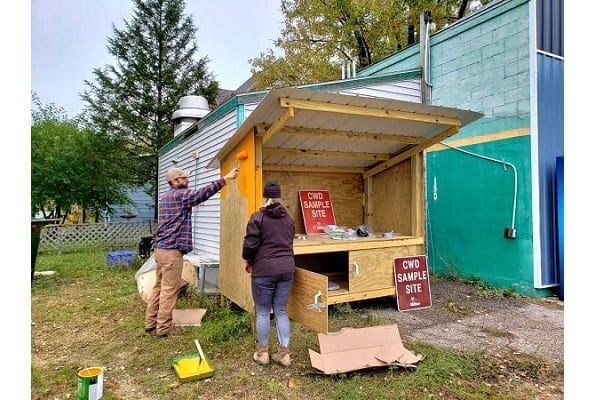More Hunters And Organizations Encouraged To Join The Fight Against Chronic Wasting Disease

Adopt-a-Kiosk And Adopt-a-Dumpster Programs Open Statewide
MADISON, Wis. – No one cares more about Wisconsin deer than Wisconsin hunters, which is why for the past two years, individuals and organizations around the state have partnered with the Department of Natural Resources to place more chronic wasting disease (CWD) self-service kiosks and carcass disposal dumpsters for hunters to help monitor and slow the spread of CWD.
This year, the Adopt-a-Kiosk (AAK) and Adopt-a-Dumpster (AAD) programs are looking for more volunteers to help us to continue to grow these programs, bringing convenient CWD testing and proper carcass disposal options to even more hunters in Wisconsin.
“We know hunters want to participate in providing CWD sampling and proper carcass disposal options because the original idea for these two programs came from hunters themselves,” said Amanda Kamps, DNR wildlife health conservation specialist. “The AAK and AAD programs give more hunters convenient opportunities to participate in CWD management around the state.”
Proper disposal of deer carcass waste is a major factor in containing the spread of CWD. The DNR is committed to providing safe, convenient disposal options to hunters, especially in areas where options are limited or unavailable.
CWD is a contagious neurological disease of deer, elk moose and reindeer that is caused by an abnormal protein called a prion. These prions cause brain degeneration in infected animals and lead to extreme weight loss, abnormal behavior and loss of bodily functions. This always fatal disease was first found in Wisconsin in 2002 through testing of hunter-harvested deer in November 2001.
CWD can be spread among deer by both direct contact between animals and indirectly through exposure to environments contaminated with CWD prions, the protein that causes the disease. Exposure to an area where a CWD-positive carcass has decomposed could be enough to cause infection in deer. Because of this risk, it is vital that deer carcasses are disposed of in a way to reduce this infection risk.
Participants in both programs are responsible for all costs associated with the adoption of dumpsters and kiosks as a donation (with the exception for those enrolled in cost-sharing for dumpsters are responsible for their share), and for following program guidelines. Volunteers will receive DNR recognition and a certificate of appreciation at the end of the season. For the second year, a cost-sharing option is available to those wishing to participate in the Adopt-a-Dumpster program.
Visit the DNR website to learn how you or your organization can get involved with Adopt-a-Kiosk or Adopt-a-Dumpster this year.
